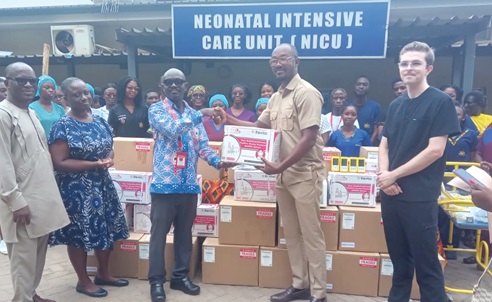More than 3,000 preterm babies in the Ashanti Region have undergone screening to detect Retinopathy of Prematurity (ROP), an eye disease that usually affects premature babies, which could lead to blindness.
Out of the number, 30 babies who were diagnosed with the disease after being born less than 30 weeks of gestation period and weighing two kilogrammes have been treated to prevent them from going blind.
The screening was made possible through a pilot project, which is the first of its kind in Sub-Saharan Africa and was rolled out in 2024 in Ghana by Africa Eye Imaging Centre — a Ghana-based Non-Governmental Organisation (NGO), in collaboration with Zero Blind Babies, also an NGO in the United States of America (USA).
Donation
The Chief Executive Officer (CEO), Africa Eye Imaging Centre, Dr Akwasi Agyeman Ahmed, disclosed this when he, on behalf of the two organisations, donated some equipment to the Neonatal Intensive Care Unit (NICU) of the Komfo Anokye Teaching Hospital (KATH).
The equipment, worth $67,000 and intended to support neonatal oxygen management and monitoring, included a Neonatal Oximeter Probe, 20, a Lifebox Pulse Oximeter, 20, a Vayu Bubble CPAP, 10, and a Pumani Bubble CPAP, 15.
He said due to increased In Vitro Fertilisation (IVF) and better neonatal management, more babies were being born as early as six and seven months, stating that the retina, a part of the eye of such babies, was not well-developed before being born.
“To achieve this, oxygen blenders are needed to help reduce the concentration of oxygen to prevent the babies from developing the condition,” Dr Ahmed pointed out.
Step further
He said the organisations decided to go a step further, apart from screening, to donate the equipment that would reduce the concentration of oxygen and then prevent them from developing ROP.
While indicating that the equipment was intended to assist KATH to save the lives of the babies and ensure better oxygen management, he said it would enable the 130-bed capacity NICU to alleviate the pressing need.
A representative of Zero Blind Babies, Hanks Wallace, said blending oxygen was critical to the health and safety of babies; thus, providing the equipment would allow for improved outcomes for thousands of babies.
Gratitude
Dr Boateng Nimako, who received the equipment on behalf of the management of the hospital, the Head, Quality Assurance, KATH, commended the organisation for the equipment as the hospital needed such items to provide the best of care to children.
He noted that KATH attended to cases from about 14 regions and, therefore, required many resources and equipment to be able to address the health needs of the patients, saying,
“The generous donations from institutions are key since the government alone cannot shoulder it”.
A Neonatologist, Mother Baby Unit, KATH, Dr Naana Wireko-Brobby, said because the facility did not initially have the means to screen the babies on admission and provide them with respiratory support, it was possible they might have missed quite some premature infants who were even blind now or have visual impairment.
Writer’s email: gilbert.agbey@graphic.com.gh

